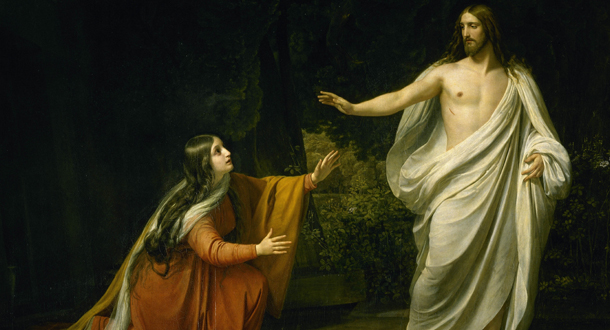 Scripture:
Scripture:
Acts 2:14, 22-33
Matthew 28:8-15
Reflection:
The joy of the apostles and the community of disciple men and women followed on the realization that Jesus was raised out of the tomb, and that he intended to re-engage with them in the imminent moment.
In fact, today’s Gospel narrative relays this information in the dialogue that Jesus has with Mary of Magdala and the other Mary, who came to visit the tomb, but were told by the angel to go tell the disciples of his Resurrection, and of his going before them to Galilee (Mt 28:5-10).
It was the reason for the ecstatic happiness of the disciples who returned from Emmaus to report that they had recognized Jesus in the breaking of the bread (Lk 24:33-35).
The importance of this enthusiastic acceptance of the Resurrection of Jesus is that it fueled the Evangelization that was to become the principal work of the Church from that day forward. This clear connection between the Resurrection of Jesus and the work of Evangelization is seen in the way that the 28th chapter of Matthew’s Gospel, from which is taken today’s Gospel reading, contains both a declaration of the Resurrection of Jesus, and a commissioning of the disciples to take the Good News of salvation to “all nations.” (Mt 28:19).
This gives the passage from the first reading, “God raised this Jesus; of this we are all witnesses” (Acts 2:32), a special significance. The self-identity of the first Christian community is not in calling themselves “Christians,” a name by which they were to become known after the establishing of the community in Antioch, they referred to themselves as “witnesses.”
Paul, in his speech to at Cornelius’ home in Caesarea (Acts 10:34-43) builds a bridge between these elements of Christian witness. Especially relevant are verses 39-43: We are witnesses of all that he did both in the country of the Jews and (in) Jerusalem. They put him to death by hanging him on a tree. This man God raised (on) the third day and granted that he be visible, not to all the people, but to us, the witnesses chosen by God in advance, who ate and drank with him after he rose from the dead. He commissioned us to preach to the people and testify that he is the one appointed by God as judge of the living and the dead. To him all the prophets bear witness, that everyone who believes in him will receive forgiveness of sins through his name.
This Christian identity of being “witnesses” is the fruit of the Resurrection of Jesus. The first disciples immediately saw the meaning of the Resurrection in the commission that Jesus gave them to become witnesses of the Good News to all the world. Today, as we celebrate the Octave of Easter, let us also renew our conviction that Jesus has called us to be His witnesses in the world, that the mission of Jesus may also be lived in and through our witness to the ongoing presence of Christ in the world. We are both his witnesses, and the living members of his body today.
Fr. Arthur Carrillo, C.P. is the director of the Missions for Holy Cross Province. He lives in Chicago, Illinois.

Great reflection!